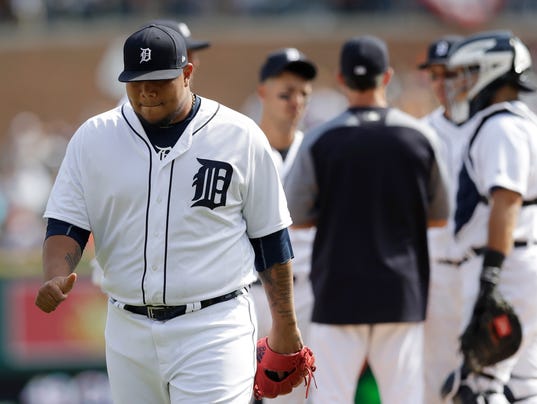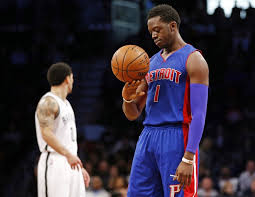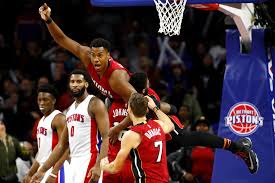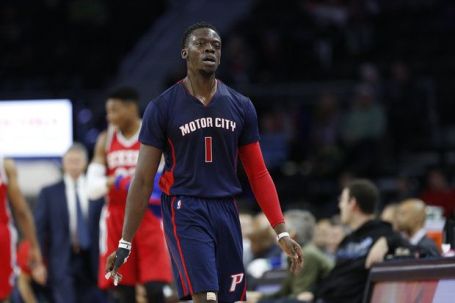Written by: Eddie Zilincik
This just in: The Detroit Tigers are going to be sellers at this year’s trading deadline… All right, you probably knew this, but who is staying and who is going?
If you have been paying attention to noted baseball writers such as Jon Paul Morosi, Peter Gammons, Buster Olney, and Jon Heyman, a number of big name Tigers will be wearing a different jersey by the month of August.
Players such as J.D. Martinez, Alex Avila, and Justin Wilson are near locks to be traded by the July 31st non-waiver trade deadline. Buster Olney even included J.D. Martinez and Justin Wilson in his recent article on players who are locks to be traded at the non-waiver trade deadline.
Ian Kinsler and Justin Verlander also have a chance to be traded, but the situation is more complicated with them because of their current contract situations, statistically down years, and Verlander’s 10-5 rights.
Recently though, a name has popped up in trade rumors that I never thought would ever be mentioned, and instead, would be considered untouchable by the front office management.
Trading Michael Fulmer? What?
You know, the Michael Fulmer who won American League Rookie of the year last season with an 11-7 record, 3.06 ERA, 1.12 WHIP and is just 24 years old.
Proving that his rookie seasons was no fluke, Fulmer has come back in his first full season (since last year he was on an innings limit and didn’t make his season debut until April 29th) and has been even better than this season.
Fulmer has so far posted a 10-6 record, 3.06 ERA in 123.2 IP, and a 1.07 WHIP, while also being selected to his first (of many) all star games.
Fulmer is under team control through the 2018 season and isn’t eligible for arbitration until the 2019 season. However, Fulmer would not hit the open market until after the 2022 season.
The Tigers would have Fulmer under their own control until after the 2022 season (which is 5.5 seasons from this point forward) and certainly could come to an agreeable number with Fulmer to avoid arbitration all together and instead pay him through the rest of his rookie contract (similar to what the Angels did with Mike Trout).
The speculation and heavy opinions all started with a Peter Gammons report. Gammons, piggybacking off of a Jon Paul Morosi report from July 3rd that said the Cubs were interested in acquiring Verlander and Avila, stated that the Cubs had moved on from Verlander and were now talking to the Tigers about Fulmer and Daniel Norris.
Forget Daniel Norris for now, the name that raised ire from the fans and local sports talk hosts was Michael Fulmer (and rightfully so). I thought to myself, well this is nothing but fodder for the local media to talk and write about since the team is nowhere near contention and once they sell, there really isn’t going to be anything to talk about until football season.
That day however, I got in the car and flipped on the radio, and there Mike Valenti was giving an impassioned speech on why the Tigers should flip Fulmer for all they can get for him right now. Later on in the day, I turned the radio back on again and Kyle Boogie was basically regurgitating what Valenti had said earlier in the day.
The unintentionally concerted message I received from both of their rants was that the Tigers need to have a complete firesale of all assets as soon as possible and that also Michael Fulmer’s best years will be wasted on a team that is going to lose 90 games a season for the next five years.
Additionally, the radio hosts stated that because Fulmer is the best asset the Tigers have (which he definitely is) he will get the most in return out of any Tiger that will be traded at the upcoming deadline and will in turn speed up the rebuild process.
Valenti and Boogie are right on a couple ideas here, the potential return on Fulmer would be astronomical and the Tigers are most definitely in need of a tear down sell off at the deadline.
Here is why they are both wrong and Fulmer shouldn’t and won’t end up being traded.
J.D. Martinez is a hot commodity

The Tigers will sell off their most tradeable assets at this upcoming deadline and hopefully (unless Al Avila does something unthinkable like not trading anyone or ends up getting fleeced in these deals) gets back near major league ready talent for the players who have high value right now (J.D Martinez, Justin Wilson, Alex Avila). The team will possibly move Kinsler and Justin Verlander as well, depending on interest and on the amount of money the Tigers are willing to eat on Verlander’s deal for what they can get for them.
The best returns that the Tigers will receive will come from J.D. Martinez and Justin Wilson. J.D. Martinez (similar to Yoenis Cespedes when he was traded before the 2015 non-waiver deadline) is a rental player who is slated to become a free agent following the end of this season. Cespedes was the player who got the Tigers Michael Fulmer and Luis Cessa (who was then traded for Justin Wilson along with prospect Chad Green by Al Avila the following winter).
For comparison sake, J.D. Martinez has a .308 batting average, 1.025 OPS., with 16 home runs and 39 RBIs. Martinez’s defense has been near the bottom of the league this season (he has a -.7 dwar and -7 defensive runs saved), but Martinez also crushes left handed pitching to a .474 batting average and a 1.105 OPS.
During his 2015 season with the Tigers, Cespedes had a .293 batting average, .829 OPS., with 18 home runs and 61 RBIs. Cespedes had a .8 dwar during his time with the Tigers, but the point remains the same that what exactly is the difference between what the Tigers traded in 2015 (which landed them Fulmer and eventually Justin Wilson) to what they are planning to trade now with JD? Fans should expect a huge haul for J.D. if Avila does his job and gets the best available deal for his asset.
Justin Wilson is having a career year

Justin Wilson (unlike J.D.) is not a rental player and is instead under contract (arbitration eligible in 2018) through the end of the 2018 season. Around this time last year, the Yankees made the un-Yankee like decision to sell at the deadline, with one of the players they sold being Andrew Miller.
The thing that made this decision so smart was that the Yankees sold Miller when he was under contract for two additional seasons after the trading deadline. Justin Wilson is nowhere near the pitcher that Andrew Miller is and has nowhere near the track record that Miller does, but he is having a career year and (like Miller) is under contract to be more than just a rental for the team that acquires him.
Wilson has great numbers this season, with a 2.29 ERA in 35.1 innings pitched. Wilson also has 50 strikeouts compared to 13 walks, with .0906 WHIP. Miller (during his 2016 time with the Yankees before being sold to the Indians) had a 1.39 ERA, .772 WHIP in 45.1 innings pitched. While the two aren’t as comparable as Cespedes and J.D. Martinez, the Tigers have one of the best (if not the best) relief arms on the market right now, who has also shown his ability to close out games (10/11 in save opportunities) with more than one year on his contract.
Reports are out today that there is a bidding war between teams who are interested in acquiring Wilson’s services (which assuredly will only help, not hurt his returns). A great return should be expected for Wilson in addition to J.D., if and only if Al Avila makes the best deal for the Tigers.
Is Chris Ilitch cheap or does he want to win?

If the Tigers do the prudent thing and trade as many as their high value players right now, while also getting what they can for Verlander and Kinsler (despite most likely having to kick in some money for Verlander), they could be back to being competitive sooner than most think, with one big if.
That big if is Chris Ilitch. Does he want to spend (obviously nowhere near the levels of his father) or is he about to turn the Detroit Tigers into the Tampa Bay Rays north?
Ian Kinsler ($10 million dollar club option, $5 million dollar buyout) and Anibal Sanchez ($16 million dollar club option, $5 million dollar buyout) come off the books following this season. The awful contracts of Mike Pelfrey ($8 million dollars) and Mark Lowe ($5.5 million dollars) will also be off the payroll following this season.
Following the 2018 season, Victor Martinez’s dead weight contract ($18 million dollars) will be off of the payroll as well. Depending on if the organization decides to trade Verlander and his 28 million dollar salary for the next two seasons (also depending how much they are willing to chip in on his contract) and if Upton decides to opt-out of his contract following this season ($22.125 million dollars through the 2021 season), the Tigers could suddenly back toward financial normalcy by the end of 2018.
By the end of the 2018 season, the Tigers will have $47.5 million dollars off the payroll they currently carry at this moment. If Upton opts out (something I wouldn’t want but would take the salary relief), they will have $69.62 million dollars off the payroll. If they trade Verlander and kick in a hefty amount of money (let’s say $20 million dollars for arguments sake, which would be $10 million for each of his two remaining seasons after this year), they will have an additional $18 million dollars chopped off of that payroll after 2018 (near $90 million dollars freed up if things go as I said).
By the end of 2018, if Avila manages the rebuild correctly and trades Verlander, the payroll will be near respectability (even if Upton doesn’t opt out). Following a purge that lands high level minor league returns this trade deadline and high draft picks after two awful campaigns in 2017 and 2018, the Tigers could then be ready to possibly spend again (fiscally responsibly on cost effective major league talent).
The Future
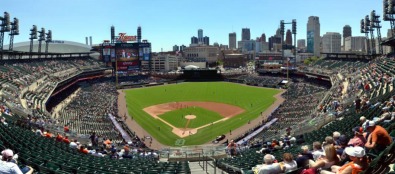
There are a lot of big questions marks here, but in my opinion, this could be the way that the Tigers could be back to respectability sooner than doing a complete Houston Astros’ tear down. The team did sell off assets in 2015 helping start the rebuild process, where they got Fulmer, Norris, Luis Cessa, and Matt Boyd.
The biggest if is whether or not Chris Ilitch wants to spend at all. The other big questions I have is will Miguel Cabrera become more like Albert Pujols or more like David Ortiz with age, will Upton opt out, and will Daniel Norris become what he was billed to be when he was obtained?
By the 2019 season, some of the Tigers current draft picks and prospects (such as Matt Manning, Beau Borrows, Kyle Funkhouser, Christian Stewart) will be major league ready, in addition to the players who are acquired at this deadline. Couple them in with Fulmer and Norris (who I expect to rebound), a more productive and healthy Miguel Cabrera than this season, Joe Jimenez at the back end of the bullpen, and whatever the Tigers add with their now found salary relief (if Chris Ilitch is willing to spend) and the team could be back to competing for the playoffs again.
Trading J.D. Martinez and the players listed above is not certain to land the team prospects that will certainly pan out. Trading Fulmer is not also a guarantee to have certified great players come back in return. One thing is nearly for certain though; Michael Fulmer is going to dominate for years to come and trading him at his age right now for uncertainty is not the right move at all when he is so young and under team control for so many years to come.
As for the next one and half years, get ready to see Victor Martinez in an empty stadium ground into the shift four times a game with Bruce Rondon blowing games at the back end of the bullpen (hint: it’s going to get ugly). With some of the payroll constraints that will still be with the team through 2018, it’s hard to envision Ilitch giving the go ahead to add heavy payroll before next season, but after 2018 it is plausible, if Ilitch gives the go ahead.
